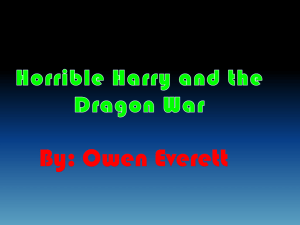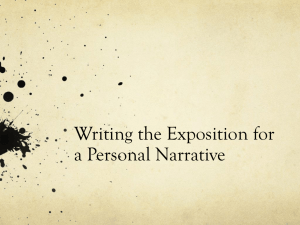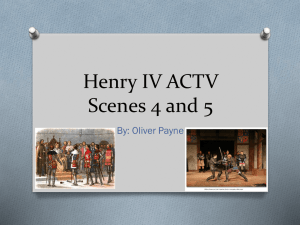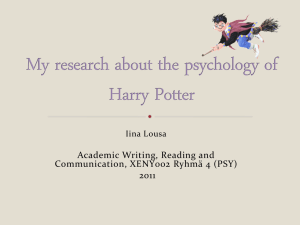WORKSHEETS by Andrew Milne-Skinner & Kristina
advertisement
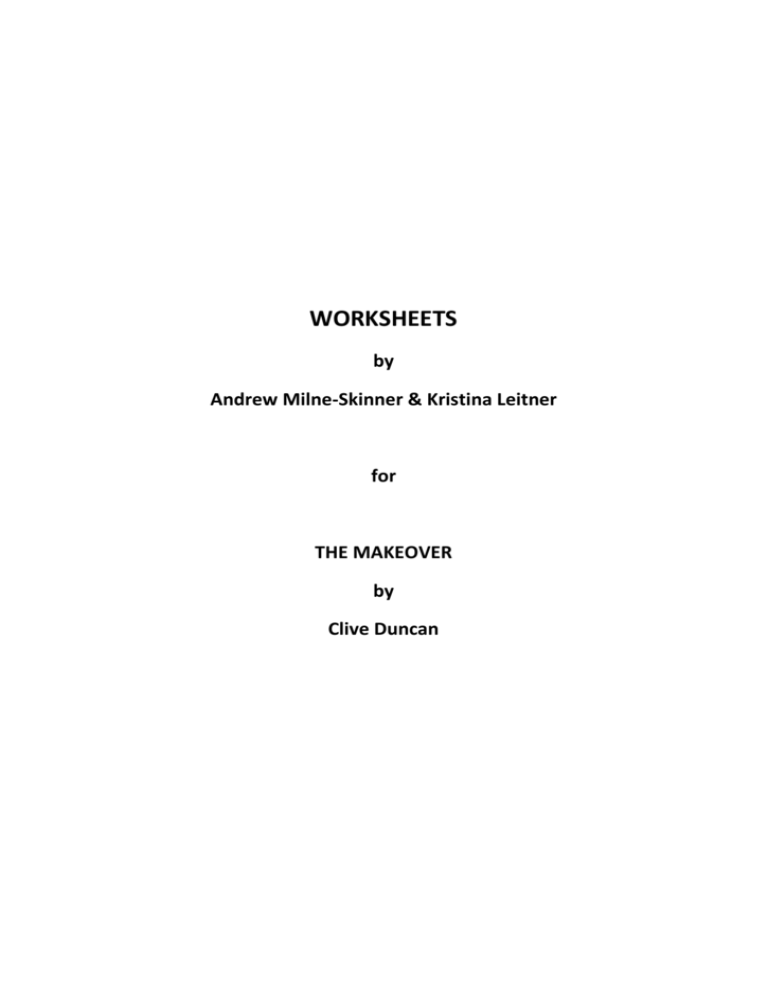
WORKSHEETS by Andrew Milne-Skinner & Kristina Leitner for THE MAKEOVER by Clive Duncan Worksheets: The Makeover These practical ideas for use in class are arranged in three sections: Pre-Reading Activities, WhileReading Questions and Tasks, and Follow-up/ Post-Reading Activities. The numbers run cumulatively through all three sections. We recommend that you are selective in what you use! We would welcome feedback on how useful you find these worksheets. kristina.leitner@uibk.ac.at A. and andrew.milne-skinner@uibk.ac.at Personal Quiz before we start: How high is your self-esteem? Take the quiz and find out. Decide whether or not each of the following statements applies to you. 1 = I totally disagree / 2 = I hardly ever agree / 3 = I agree sometimes 4 = I agree most of the time / 5 = I totally agree all the time …. A. I’m a worthwhile person – at least as good as anybody else. …. B. I’ve got a lot of good qualities. …. C. Overall, I think I’m a failure. …. D. I can do things as well as other people. …. E. I don’t have a lot to be proud of. …. F. I have a positive attitude about myself. …. G. Overall, I’m pretty satisfied with myself. …. H. I wish I could have more respect for myself. …. I. Sometimes I feel useless. …. J. Sometimes I think I’m no good. Scoring Add up your points to find out your self-esteem score. Items C, E, H, I and J need to be reverse scored (that is, convert your score like this: 1 = 5, 2 = 4, 4 = 2, 5 = 1). Possible scores range from 10 to 50. The higher your score, the better your self-esteem. 10 – 20: Your self-esteem has taken a beating. Have you considered talking with a trusted friend for some guidance and support? A makeover is a must. 20 – 40: Your self-esteem could use a little boost. Try a makeover. Try developing new interests and hobbies. Take pride in every small achievement you make. 40 – 50: You’re a person with a healthy sense of self-esteem. You hardly need a makeover. Unit 9 Being Young, Free and...? in Project Resource Book 2 of Meanings in Use 2, by J. Kaiser, A. Skinner & B. Weinhofer (öbv, 2000) Pre-Reading Activities 1. Check in a monolingual dictionary for a working definition of the verb ‘to make over’. You may well find it in the context of ‘to make sth. over to so./sth.’ Here the meaning is ‘to transfer the ownership of something’, as in ‘He has made over the whole property to his eldest daughter’. But a second meaning is ‘to change or improve the appearance of so./ sth.’ As a noun, the title of our play, ‘makeover’, it means ‘a set of changes that make a person or thing look much better’. The verb ‘to make’ has particular meanings when it is used as a phrasal verb. Check the meaning of the following phrasal verbs and find example sentences to reflect each meaning: to make up: ________________________________________________________ to make for: ________________________________________________________ to make into: ________________________________________________________ to make of: ________________________________________________________ to make off: ________________________________________________________ to make out: ________________________________________________________ 2. Characters in the play In the course of reading the play, gradually build up a sociogram, a diagram of the social inter-relationships of the various characters. Are the relationships close or distant? Use visual motifs and arrows to show who likes/ loves whom (inclined hearts), where there are tensions (lightning motif), who is socially superior (at the top of the diagram), and so on. 3. Setting Describe what a ‘scruffy student flat’ might look like. Its size? Arrangement? Storage space? Appearance? Degree of order and cleanliness? And so on. While-reading Questions and Tasks Scene 1 – Graduation Day 4. Act out the opening part of Scene 1. Pay close attention to dress etiquette, movement and gesture, facial expression and tone of voice. 5. Analyse closely how the student handles the interview. Identify the various stages: seeking permission to interview; thanking for that; setting the scene ; inviting the interviewee to comment; confirming; clarifying; challenging; digging deeper; cross-checking; explaining what will happen after the interview; quoting; rounding off. 6. Find out about Vivienne Westwood and how she is connected here in Austria. 7. Ali recommends studying at university. How does she justify that? Which other reasons can you find for going on to study after school? 8. Which initial impressions do we have of Ali? Identify the parts of the text which suggest these. 9. How does she feel at the end of the interview, and why? Scene 2 – First impressions 10. How important might it be, according to Ali, to have a boyfriend (or girlfriend) when you first come up to university or college? 11. Which initial impressions do we have of Harry? 12. An idiom in English runs: “Two’s company; three’s a crowd”. How might this apply to the triangular relationship in this scene? 13. Find examples in this scene of how Ali uses irony and even sarcasm towards Harry. 14. When it comes to studying, are you more a morning lark or a night owl? 15. Offer short biographical sketches of each of the fashion designers mentioned by Harry. 16. Quote: “A person who has not done one half of his day’s work by ten o’clock runs a chance of leaving the other half undone.” Emily Bronte (1814-1848), author of Wuthering Heights. Would you like to comment on this statement, and even discuss it? 17. So, would you want to share a flat with Harry? Why (not)? Scene 3 – And Harry makes three…. 18. 19. 20. 21. Suggest suitable background atmospheric music for this scene. In which different ways do the actors on stage make use of the sofa as a stage prop? Act out this comic scene, paying close attention to the stage directions. Listen to Bohemian Rhapsody by Queen. How might it be suitable for this scene? Scene 4 – When Harry met Gina 22. Can love at first sight really happen, do you think? Explain why (not)? 23. What makes the first meeting of Harry and Gina so ironic? (Image projection? Mistaken identity?) 24. Note the pun (play on words) on ‘date’. A date can either be a fixed day of the week or a romantic rendez-vous. What else can a ‘date’ be? 25. Which stark contrasts can you identify between Gina and Harry? 26. What tells us that Gina is a highly-focussed and serious student? 27. An idiom in English runs: “You’ve got to start somewhere in life.” How does Harry now start? Scene 5 – Lovesick 28. How do you see the difference between love and infatuation? 29. “Wastrel? That’s Shakespearean…” See the follow-up mini-project in Post- Reading Activities (no. 90). 30. The word ‘fall’ is often used in relation to love. What are the differences in meaning between the following phrases? Find an example sentence to reflect each meaning: to fall for someone: __________________________________________________ to fall in love: __________________________________________________ to fall out of love: __________________________________________________ 31. How does Ali propose to change Harry? Scene 6 – The Makeover 32. 33. 34. 35. 36. 37. 38. 39. 40. 41. 42. 43. 44. Can clothes really ‘make the man’ do you think? Is the way you dress really an expression of how you feel inside? In what way? Is it really true that ‘What you see in the mirror changes the way you see yourself’? For a task relating to ‘Frankenstein’s monster’, see the Post-Reading Activities (no.89). How does Ali treat Harry when he says he wants to have fun, too? What is meant by the expression ‘to walk the talk’? How important is a handshake when you first meet someone? What do you think is important in a handshake? Act out that part of this scene where Ali shows Harry how to greet Gina. What seems to be happening in the relationship between Harry and Ali? To what extent is Harry interested in surface style and image? Find out about Zadie Smith. Why might Gina be especially interested in having Zadie Smith give a lecture? At which point in this scene does pretending become real? How useful is Ali’s training in social etiquette, do you think? Produce a list of practical do’s and don’ts. Scene 7 – The Date 45. Would you care to bet with Tom that Harry ‘won’t last half an hour with Gina’ in the Italian restaurant? Do you think the makeover will really work? 46. What does Gina’s remark about J.K. Rowling getting all the film rights tell us about her character and what she is really interested in? 47. For a project on advertisements for Cartier, Mercedes Benz, Armani, and Chanel see PostReading Activities. 48. ‘Skiing in St. Moritz, diving in the Seychelles’. Continue Harry’s luxury dreams by using the gerund as in ‘sipping cocktails on the balcony of the Hotel Cipriani in Venice’. 49. How does Harry ‘talk the talk’? How much of the ‘gift of the gab’ does he really have? 50. What seems to lead to OCD? In which ways does it show itself? How can it be treated? (Mini research project). 51. Analyse the cover and list of contents of a copy of Vogue magazine (see Appendix). You might like to apply the 'AIDA'-formula to the cover, that is: In which way does the cover catch the Attention of the reader? How does it generate Interest? How does it stimulate Desire? And how does it encourage Action? 52. With reference to ‘Frankenstein’s monster’, turn to the Post-Reading Activities (no.89). 53. How does Harry exercise class ‘one-upmanship’ (feeling socially superior) over Tom? Does he try to gain an advantage over Tom? Scene 8 – Meeting the parents 54. How believable is the turnabout in Harry’s lifestyle as a student, do you think? 55. How deep and well-founded is Harry’s makeover, do you think? Offer reasons for your opinion. 56. Interpret how the reference to Verdi’s opera Rigoletto might apply to Harry? (Tom may be implying that Harry is rather like a figure of fun and that some supernatural power – perhaps Gina's attraction and influence – might lead to his ultimate downfall.) 57. 58. 59. 60. 61. 62. 63. 64. 65. 66. 67. 68. 69. 70. 71. 72. 73. 74. How sincere do you think Ali is when she tells Harry he looks ‘wonderful’? Was it fair of Tom (and Gina) to ‘set up’ Harry? Why (not)? In which ways have Ali, Tom and even Gina manipulated Harry? To what extent was the scheme, the ‘set -up’, important or not for each of the four characters? To what extent do you agree that design is about enhancing what exists, about improving what there is, about realising potential? How valid are Gina’s arguments about not ‘doing romantic’, do you think? What does Gina believe to be a compliment? Give examples of how the Bennetts are (a) only business-oriented and (b) social climbers. What does Mrs Bennett’s forgetting Harry’s actual name tell us about her character? How does Harry also play the Bennetts’ game of name-dropping? What tells us the Bennetts are only superficial ‘culture vultures’, that is, people who are very interested in music, art, theatre, etc.? Imitate the gesture that Mr Bennett makes just before the opera starts. Try to articulate the following names to clearly differentiate between them: Harry, Gary, Terry, Barry. Now adopt a high-pitched pseudo-aristocratic tone of voice to slide easily from one name to another without differentiating. In which ways has Gina herself been conditioned by her parents’ lifestyle? Harry says there are two ways to go on a journey. See the Post-Reading Activities (no.87). How do you think Harry feels when he is betrayed by Gina? What did Harry really want? In which way are Tom and Harry ‘quits’, according to Tom? Scene 9 – Happily Ever After 75. In the end, Harry seems to be the only one with any moral principles. Do you agree? 76. In Oscar Wilde’s play Lady Windermere’s Fan, Lord Darlington defines a cynic as “a man who knows the price of everything and the value of nothing”. Ali uses a similar description for Gina. To what extent do you think Gina is a cynic? 77. Explain the reasons for Harry’s later success at University. Follow-up/ Post-Reading Activities 78. Characterization (A) Try and allocate these various adjectives to each of the four main characters: Ali, Gina, Harry and Tom. Any one adjective might apply to more than one character. Justify your choice of adjective by quoting from the text. You may agree to disagree with your fellow-students! Feel free to add other adjectives that you think are appropriate! Adjectives assertive/ bohemian/ caring/ cautious/ casual/ childish/ cynical/ directive/ dishonest/ disorderly/ dynamic/ easy-going/ encouraging/ enthusiastic/ false/ flirtatious/ goal-oriented/ hard-working/ helpful/ hesitant/ highly focused/ honest/immature/ impassive/ insecure/ ironic/ keen/ laid back/ lazy/ manipulative/ methodical/ non-conformist/ obsessive/ playful/ responsible/ ruthless/ scheming/ self-confident/ serious/ sincere/ success-oriented/ static/ superficial/ supportive/ systematic/ unashamed/ …/ … 79. Characterization (B) Gina is described by Tom as a ‘real tiger’ (Scene 4). How do you see each of the four main characters in terms of animals? Give examples, and explain why you have chosen that particular animal. 80. Characterization (C) Analyse Harry using a ‘SWOT’-analysis. That is, what are his present Strengths and Weaknesses, as well as future Opportunities open to him, in contrast to Threats (or dangers) that might affect him? Draw quadrants on an ‘A4’-sheet, add specific notes for each of the squares, and see where the balance lies: Positive or negative? Present-based or futureoriented? 81. Characterization (D) In the interview Gina says her main achievement was redesigning Harry. Her whole life plan is based on achieving. She is, arguably, an obsessive achiever. Study this extract from a self-help manual on the theme of ‘Achiever’. In which ways do you recognize Gina here? Your Achiever theme helps explain your drive. Achiever describes a constant need for achievement. You feel as if every day starts at zero. By the end of the day you must achieve something tangible in order to feel good about yourself. And by ‘every day’ you mean every single day – workdays, weekends, vacations. You have an internal fire burning inside you. It pushes you to do more, to achieve more. Your relentless need for achievement might not be logical. But it is the jolt you can always count on to get you started on new tasks, new challenges. It is the theme that keeps you moving. (Now, Discover your Strengths, by M. Buckingham & D.O. Clifton, Free Press Business, 2002) 82. Structure Chart Draw a diagram that shows the course of the action through the play: the ups and down of the plot, the dramatic turning-points, and how the story is resolved. Label your diagram. 83. Mind-Map of themes Which themes or underlying ideas can you identify in the play? (e.g.: contrasting lifestyles/ attitudes to studying/ image projection/ identity crisis/ etc.) Create your own mind-map, with branches, showing how you see the themes and how they inter-relate. Compare with a partner. 84. Idioms, Proverbs and Themes How do each of these expressions or phrases relate to themes in the play: (a) to turn over a new leaf, (b) a leopard can’t change its spots, (c) ‘Clothes maketh the man’, (d) love at first sight, (e) ‘a person who knows the price of everything but the value of nothing’. Indicate in the text where these ideas appear. 85. “A man who knows the price of everything and the value of nothing.” This is how Lord Darlington defines a cynic in Act III of Oscar Wilde’s play Lady Windermere’s Fan (1892). The play contains a number of witty quotations by Lord Darlington that echo aspects of our play. Discuss some of these quotations in the context of the play: (a) “I think that life is far too important a thing ever to talk seriously about it.” (b) “It is a dangerous thing to reform anyone, Lady Windermere.” (c) “It is absurd to divide people into good and bad. People are either charming or tedious.” (d) “Most women, for instance, nowadays, are rather mercenary.” (e) “I can resist everything except temptation.” (f) “Between men and women there is no friendship possible. There is passion, enmity, worship, love, but no friendship.” (g) “We are all bad, we are all in the gutter, but some of us are looking at the stars.” 86. 'Two Ways to go on a Journey' Discuss critically each of these statements about travelling: (a) “To travel hopefully is a better thing than to arrive, and the true success is to labour.” (R.L. Stevenson) (b) “What is this world if, full of care, We have no time to stand and stare?” (W.H. Davies) (c) “Festina lente”/ “Hasten slowly”/ “Eile mit Weile” 87. Design, Fashion and Style Style is functional in the true sense of the word. Our dress, hairstyle, footwear, make-up – what the sociologist Irving Giffman collectively termed our ‘presentation of self’ – functions as a medium of expression, often corresponding to our lifestyle. Visual communication can ‘say’ certain things more immediately and powerfully than verbal language ever can. Question: Is this why ‘first impressions’ really count when we first see and meet someone new? Historically speaking, the 1960s brought about a real break with the age of the aloof, often haughtily elegant haute couture mannequin of the 1950s. Geometrically patterned miniskirts became the rage. All the old poses, gestures and clothes underwent a radical makeover. Task: Listen to the song Dedicated Follower of Fashion, by The Kinks. In which ways does the song reflect the 1960s ‘Swinging London’ fashion scene? The 1970s and 1980s saw loose-fitting Punk designs challenge regularity of form and colour harmonies. Question and mini research project: In which ways has Vivienne Westwood influenced fashion since the 1980s? Task: Design costumes for each of the characters in our play. 88. Comments on Clothes and Fashion Discuss critically each of these statements: (a) “Beware of all enterprises that require new clothes.” (Henry David Thoreau, 1817-1862) (b) “Clothes don’t make the man, but they go a long way toward making a businessman.” (Thomas Watson Senior, 1874-1956) (c) “When I began, at least women dressed to please me. Now they dress to astonish one another.” (Coco Chanel, 1883-1971) (d) “Chanel No.5.” (Marilyn Monroe, 1926-1962, on being asked what she wore in bed) (e) “I don’t really like knees.” (Yves Saint Laurent, 1936-2008) (f) “I like to dress egos. If you haven’t got an ego today, you can forget it.” (Gianni Versace, 1949-1996) (g) “Every time you open your wardrobe, you look at your clothes and you wonder what you are going to wear. What you are really saying is: ‘Who am I going to be today?’” (Fay Weldon, 1931-…) (h) “I just don’t think that the way Beckham dresses is very sophisticated. He’s got a lot of money, but it just seems a little nouveau riche, a little cheesy.” (Robert Geller, quoted in Fashion Industry Hunts for Next Beckham by John Koblin, published in The New York Times International Weekly through Der Standard, Monday June 16, 2014) 89. Ali as Frankenstein? In Scene 6 Harry is described as walking like Frankenstein’s monster after Ali has taken him to the clothes shop to be ‘redesigned’. In Scene 7 Tom says that Ali has created a monster out of Harry, Frankenstein’s monster. Study this extract from Mary Shelley’s Frankenstein (1819), Chapter 4: “When I found so astonishing a power placed within my hands, I hesitated a long time concerning the manner in which I should employ it. […] I doubted at first whether I should attempt the creation of a being […].” Question: did Ali hesitate a long time or have any doubts about what she was undertaking? Quote from the play to support your view. 90. “Wastrel? That’s Shakespearean…” Henry, Prince of Wales: “If all the year were playing holidays, To sport would be as tedious as to work; …. So, when this loose behavior I throw off, … My reformation, glittering o’er my fault, Shall show more goodly, …” (King Henry IV, Part 1, Act I, Scene 2) The young prince Henry, son of King Henry IV, wastes his time drinking with Falstaff and his gang, carrying out robberies and even robbing Falstaff himself! But an advisor to the King predicts that the son will give up his riotous living: “The Prince will, in the perfectness of time, Cast off his followers.” (Act IV, Scene 4) In fact, at the end of the play, the newly crowned Henry V rejects Falstaff and his former friends in public:“I know thee not, old man… …being awake, I do despise my dream. …. Presume not, that I am the thing I was: For heaven doth know, so shall the world perceive, That I have turn’d away my former self.” (Act V, Scene 5) In short, the ‘wastrel’ Prince has taken on his full responsibility as a serious king. He has changed his ways. He has given himself a ‘makeover’! Question: Can you find other examples from books, plays and films where characters have undergone a radical makeover? 91. Classic Makeovers It’s worth looking at how characters have changed or been changed dramatically in these texts: (a) (b) (c) (d) (e) (f) (g) Malvolio in Shakespeare’s Twelfth Night Katharina in Shakespeare’s The Taming of the Shrew Dorian Gray in Oscar Wilde’s novel The Picture of Dorian Gray Eliza Doolittle in George Bernard Shaw’s Pygmalion Rita in Willy Russell’s Educating Rita ….. ….. Appendix Cover of Vogue Spain, June 2014 …


